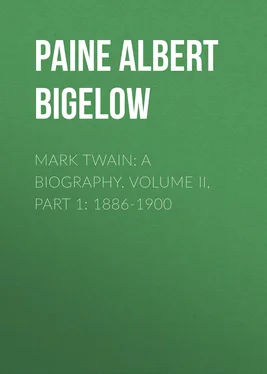Albert Paine - Mark Twain - A Biography. Volume II, Part 1 - 1886-1900
Здесь есть возможность читать онлайн «Albert Paine - Mark Twain - A Biography. Volume II, Part 1 - 1886-1900» — ознакомительный отрывок электронной книги совершенно бесплатно, а после прочтения отрывка купить полную версию. В некоторых случаях можно слушать аудио, скачать через торрент в формате fb2 и присутствует краткое содержание. Жанр: Биографии и Мемуары, foreign_antique, на английском языке. Описание произведения, (предисловие) а так же отзывы посетителей доступны на портале библиотеки ЛибКат.
- Название:Mark Twain: A Biography. Volume II, Part 1: 1886-1900
- Автор:
- Жанр:
- Год:неизвестен
- ISBN:нет данных
- Рейтинг книги:5 / 5. Голосов: 1
-
Избранное:Добавить в избранное
- Отзывы:
-
Ваша оценка:
- 100
- 1
- 2
- 3
- 4
- 5
Mark Twain: A Biography. Volume II, Part 1: 1886-1900: краткое содержание, описание и аннотация
Предлагаем к чтению аннотацию, описание, краткое содержание или предисловие (зависит от того, что написал сам автор книги «Mark Twain: A Biography. Volume II, Part 1: 1886-1900»). Если вы не нашли необходимую информацию о книге — напишите в комментариях, мы постараемся отыскать её.
Mark Twain: A Biography. Volume II, Part 1: 1886-1900 — читать онлайн ознакомительный отрывок
Ниже представлен текст книги, разбитый по страницам. Система сохранения места последней прочитанной страницы, позволяет с удобством читать онлайн бесплатно книгу «Mark Twain: A Biography. Volume II, Part 1: 1886-1900», без необходимости каждый раз заново искать на чём Вы остановились. Поставьте закладку, и сможете в любой момент перейти на страницу, на которой закончили чтение.
Интервал:
Закладка:
On the home trip they sighted a wandering vessel, manned by blacks, trying to get to New York. She had no cargo and was pretty helpless. Later, when she was reported again, Clemens wrote about it in a Hartford paper, telling the story as he knew it. The vessel had shipped the crew, on a basis of passage to New York, in exchange for labor. So it was a "pleasure-excursion!" Clemens dwelt on this fancy:
I have heard of a good many pleasure-excursions, but this heads the list. It is monumental, and if ever the tired old tramp is found I should like to be there and see him in his sorrowful rags and his venerable head of grass and seaweed, and hear the ancient mariners tell the story of their mysterious wanderings through the solemn solitudes of the ocean.
Long afterward this vagrant craft was reported again, still drifting with the relentless Gulf Stream. Perhaps she reached New York in time; one would like to know, but there seems no good way to find out.
That first Bermuda voyage was always a happy memory to Mark Twain. To Twichell he wrote that it was the "joyousest trip" he had ever made:
Not a heartache anywhere, not a twinge of conscience. I often come to myself out of a reverie and detect an undertone of thought that had been thinking itself without volition of mind—viz., that if we had only had ten days of those walks and talks instead of four.
There was but one regret: Howells had not been with them. Clemens denounced him for his absence:
If you had gone with us and let me pay the fifty dollars, which the trip and the board and the various knick-knacks and mementos would cost, I would have picked up enough droppings from your conversation to pay me five hundred per cent. profit in the way of the several magazine articles which I could have written; whereas I can now write only one or two, and am therefore largely out of pocket by your proud ways.
Clemens would not fail to write about his trip. He could not help doing that, and he began "Some Rambling Notes of an Idle Excursion" as soon as he landed in Hartford. They were quite what the name would signify —leisurely, pleasant commentaries on a loafing, peaceful vacation. They are not startling in their humor or description, but are gently amusing and summery, reflecting, bubble-like, evanescent fancies of Bermuda. Howells, shut up in a Boston editorial office, found them delightful enough, and very likely his Atlantic readers agreed with him. The story of "Isaac and the Prophets of Baal" was one that Capt. Ned Wakeman had told to Twichell during a voyage which the latter had made to Aspinwall with that vigorous old seafarer; so in the "Rambling Notes" Wakeman appears as Captain Hurricane Jones, probably a step in the evolution of the later name of Stormfield. The best feature of the series (there were four papers in all) is a story of a rescue in mid-ocean; but surely the brightest ripple of humor is the reference to Bermuda's mahogany-tree:
There was exactly one mahogany-tree on the island. I know this to be reliable because I saw a man who said he had counted it many a time and could not be mistaken. He was a man with a haze lip and a pure heart, and everybody said he was as true as steel. Such men are all too few.
Clemens cared less for these papers than did Howells. He had serious doubts about the first two and suggested their destruction, but with Howells's appreciation his own confidence in them returned and he let them all go in. They did not especially advance his reputation, but perhaps they did it no harm.
CXII
A NEW PLAY AND A NEW TALE
He wrote a short story that year which is notable mainly for the fact that in it the telephone becomes a literary property, probably for the first time. "The Loves of Alonzo Fitz-Clarence and Rosannah Ethelton" employed in the consummation what was then a prospect, rather than a reality—long-distance communication.
His work that summer consisted mainly of two extensive undertakings, one of which he completed without delay. He still had the dramatic ambition, and he believed that he was capable now of constructing a play entirely from his own resources.
To Howells, in June, he wrote:
To-day I am deep in a comedy which I began this morning—principal character an old detective. I skeletoned the first act and wrote the second to-day, and am dog-tired now. Fifty-four pages of MS. in seven hours.
Seven days later, the Fourth of July, he said:
I have piled up one hundred and fifty-one pages on my comedy. The first, second and fourth acts are done, and done to my satisfaction, too. To-morrow and next day will finish the third act, and the play. Never had so much fun over anything in my life never such consuming interest and delight. And just think! I had Sol Smith Russell in my mind's eye for the old detective's part, and bang it! he has gone off pottering with Oliver Optic, or else the papers lie.
He was working with enthusiasm, you see, believing in it with a faith which, alas, was no warrant for its quality. Even Howells caught his enthusiasm and became eager to see the play, and to have the story it contained told for the Atlantic.
But in the end it proved a mistake. Dion Boucicault, when he read the manuscript, pronounced it better than "Ah Sin," but that was only qualified praise. Actors who considered the play, anxious enough to have Mark Twain's name on their posters and small bills, were obliged to admit that, while it contained marvelous lines, it wouldn't "go." John Brougham wrote:
There is an absolute "embarrassment of riches" in your "Detective" most assuredly, but the difficulty is to put it into profitable form. The quartz is there in abundance, only requiring the necessary manipulation to extract the gold.
In narrative structure the story would be full of life, character, and the most exuberant fun, but it is altogether too diffuse in its present condition for dramatic representation, and I confess I do not feel sufficient confidence in my own experience (even if I had the time, which on reflection I find I have not) to undertake what, under different circumstances, would be a "labor of love."
Yours sincerely, JOHN BROUGHAM.That was frank, manly, and to the point; it covered the ground exactly. "Simon Wheeler, the Amateur Detective," had plenty of good material in it—plenty of dialogue and situations; but the dialogue wouldn't play, and the situations wouldn't act. Clemens realized that perhaps the drama was not, after all, his forte; he dropped "Simon Wheeler," lost his interest in "Ah Sin," even leased "Colonel Sellers" for the coming season, and so, in a sort of fury, put theatrical matters out of his mind.
He had entered upon what, for him, was a truer domain. One day he picked up from among the books at the farm a little juvenile volume, an English story of the thirteenth century by Charlotte M. Yonge, entitled, The Prince and the Page. It was a story of Edward I. and his cousins, Richard and Henry de Montfort; in part it told of the submerged personality of the latter, picturing him as having dwelt in disguise as a blind beggar for a period of years. It was a story of a sort and with a setting that Mark Twain loved, and as he read there came a correlative idea. Not only would he disguise a prince as a beggar, but a beggar as a prince. He would have them change places in the world, and each learn the burdens of the other's life.—[There is no point of resemblance between the Prince and the Pauper and the tale that inspired it. No one would ever guess that the one had grown out of the readings of the other, and no comparison of any sort is possible between them.]
The plot presented physical difficulties. He still had some lurking thought of stage performance, and saw in his mind a spectacular presentation, with all the costumery of an early period as background for a young and beautiful creature who would play the part of prince. The old device of changelings in the cradle (later used in Pudd'nhead Wilson) presented itself to him, but it could not provide the situations he had in mind. Finally came the thought of a playful interchange of raiment and state (with startling and unlooked-for consequence)—the guise and personality of Tom Canty, of Offal Court, for those of the son of Henry VIII., little Edward Tudor, more lately sixth English king of that name. This little prince was not his first selection for the part. His original idea had been to use the late King Edward VII. (then Prince of Wales) at about fifteen, but he found that it would never answer to lose a prince among the slums of modern London, and have his proud estate denied and jeered at by a modern mob. He felt that he could not make it seem real; so he followed back through history, looking along for the proper time and prince, till he came to little Edward, who was too young —but no matter, he would do.
Читать дальшеИнтервал:
Закладка:
Похожие книги на «Mark Twain: A Biography. Volume II, Part 1: 1886-1900»
Представляем Вашему вниманию похожие книги на «Mark Twain: A Biography. Volume II, Part 1: 1886-1900» списком для выбора. Мы отобрали схожую по названию и смыслу литературу в надежде предоставить читателям больше вариантов отыскать новые, интересные, ещё непрочитанные произведения.
Обсуждение, отзывы о книге «Mark Twain: A Biography. Volume II, Part 1: 1886-1900» и просто собственные мнения читателей. Оставьте ваши комментарии, напишите, что Вы думаете о произведении, его смысле или главных героях. Укажите что конкретно понравилось, а что нет, и почему Вы так считаете.












